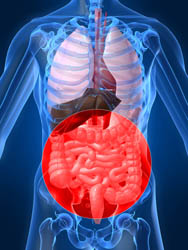The role of protease enzymes in IBD
IBD are chronic disorders of the gastrointestinal tract or gut affecting 1 in 250 people in Europe. Crohn's disease (CD) and ulcerative colitis (UC) are subtypes of IBD with relapsing and remitting of symptoms such as abdominal discomfort or diarrhoea, severe abdominal pain, rectal bleeding, anaemia and weight loss. In severe cases, surgery is required to remove the damaged parts of the intestine. Currently, UC can be cured only by complete removal of the colon and replaced with a stoma bag for faeces collection. CD is incurable. Usual treatment for IBD is immune-suppression to reduce chronic inflammation and painful symptoms that is triggered by intestinal microbes. To address this, the EU-funded 'Inflammation bowe disease (IBD): proteases offer new targets for drug discovery' (IPODD) project looked at the role of matrix metalloproteinase (MMP) enzymes in IBD pathogenesis. These enzymes break down other proteins such as those found in the space surrounding cells, and clear the way for inflammatory cells to reach a specific tissue. The activity of MMP enzymes is controlled by the tissue inhibitors of metalloproteinases (TIMPs). When there is an imbalance between MMP and TIMP, tissue damage and chronic inflammation occurs. Project scientists compared the expression of MMPs in normal and chronically inflamed gut to identify enzymes that could be inhibited by specific TIMPs or drugs. They also verified an association between neuro-immune responses, proteases and chronic gut inflammation explaining the correlation between stress and symptom relapse in IBD patients. The IPODD consortium also discovered that sometimes the inflammation-associated proteases originated from the gut bacteria. The revelation that bacterial proteases are involved in IBD pathogenesis urged scientists to test various inhibitors and agonists of bacterial proteases as well as a probiotic mixture in mouse models of IBD. Overall, work by the IPODD study generated important knowledge and underscored the importance of enteric bacteria in the pathogenesis of IBD. Exploiting these microorganisms to express natural inhibitors of MMPs are being considered as an alternative strategy to counteract inflammation in IBD patients.







